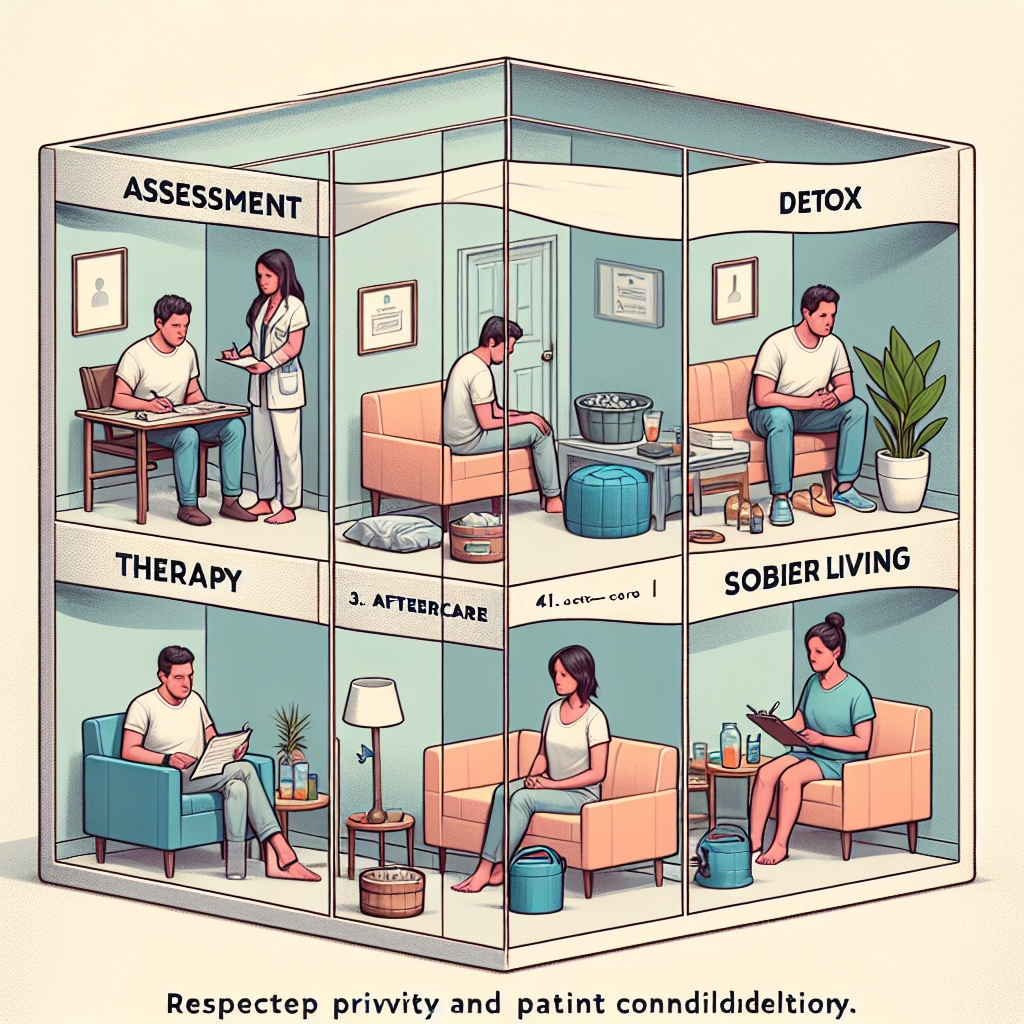-
Table of Contents

“Empowering Lifelong Recovery: Transforming Addiction into a Journey of Hope.”
Introduction
Addiction recovery services play a crucial role in addressing long-term addiction by providing comprehensive support and structured programs designed to help individuals overcome substance dependence. These services encompass a range of therapeutic interventions, including medical detoxification, counseling, behavioral therapies, and support groups, all aimed at addressing the physical, psychological, and social aspects of addiction. By offering personalized treatment plans, continuous monitoring, and aftercare support, addiction recovery services facilitate sustained recovery, helping individuals rebuild their lives and maintain sobriety over the long term.
The Role of Addiction Recovery Services in Sustaining Long-Term Sobriety
Addiction recovery services play a pivotal role in sustaining long-term sobriety, offering a lifeline to individuals grappling with the complexities of addiction. These services encompass a wide range of support mechanisms, including counseling, medical treatment, peer support groups, and holistic therapies. By addressing the multifaceted nature of addiction, recovery services provide a comprehensive approach that can significantly enhance the chances of long-term recovery.
One of the primary benefits of addiction recovery services is the provision of a structured environment. This structure is crucial for individuals who have often lived in chaos due to their addiction. Through regular therapy sessions, support group meetings, and scheduled activities, individuals can develop a routine that fosters stability and predictability. This newfound structure can be instrumental in helping individuals resist the urge to return to their addictive behaviors.
Moreover, addiction recovery services offer personalized treatment plans tailored to the unique needs of each individual. This personalized approach ensures that the underlying causes of addiction, such as trauma, mental health disorders, or social factors, are adequately addressed. By tackling these root causes, recovery services can help individuals develop healthier coping mechanisms and reduce the likelihood of relapse.
In addition to personalized treatment, the sense of community provided by addiction recovery services cannot be overstated. Peer support groups, such as Alcoholics Anonymous or Narcotics Anonymous, offer a platform for individuals to share their experiences, challenges, and triumphs. This sense of camaraderie and mutual support can be incredibly empowering, as individuals realize they are not alone in their journey. The shared experiences and collective wisdom of the group can provide invaluable insights and encouragement, fostering a sense of belonging and hope.
Furthermore, addiction recovery services often incorporate holistic therapies that address the mind, body, and spirit. Practices such as yoga, meditation, and art therapy can help individuals reconnect with themselves and find inner peace. These therapies can also serve as healthy outlets for stress and emotions, reducing the reliance on substances as a coping mechanism. By promoting overall well-being, holistic therapies can enhance the effectiveness of traditional treatment methods and support long-term recovery.
Another critical aspect of addiction recovery services is the focus on relapse prevention. Relapse is a common part of the recovery journey, but it does not signify failure. Recovery services equip individuals with the tools and strategies needed to navigate triggers and high-risk situations. Through cognitive-behavioral therapy, individuals can learn to identify and challenge negative thought patterns that may lead to relapse. Additionally, ongoing support and aftercare programs ensure that individuals continue to receive guidance and encouragement even after completing formal treatment.
The role of addiction recovery services extends beyond the individual to their families and communities. Family therapy and education programs can help loved ones understand the nature of addiction and learn how to support their recovering family member effectively. By fostering a supportive and understanding environment, families can play a crucial role in the recovery process.
In conclusion, addiction recovery services are indispensable in sustaining long-term sobriety. Through structured environments, personalized treatment plans, community support, holistic therapies, and relapse prevention strategies, these services provide a comprehensive framework for recovery. By addressing the physical, emotional, and psychological aspects of addiction, recovery services empower individuals to reclaim their lives and build a future free from the grip of addiction. The journey to sobriety is undoubtedly challenging, but with the right support and resources, long-term recovery is not only possible but achievable.
How Comprehensive Addiction Recovery Services Facilitate Long-Term Healing
Addiction is a complex and multifaceted issue that affects millions of individuals and their families worldwide. The journey to recovery is often fraught with challenges, but comprehensive addiction recovery services can play a pivotal role in facilitating long-term healing. These services encompass a wide range of interventions, from medical treatment and psychological support to social services and community-based programs. By addressing the various dimensions of addiction, these services offer a holistic approach that can significantly enhance the chances of sustained recovery.
One of the key components of comprehensive addiction recovery services is medical treatment. This often includes detoxification, which is the process of safely removing harmful substances from the body. Detoxification is usually the first step in the recovery journey and is crucial for managing withdrawal symptoms, which can be severe and even life-threatening. Medical professionals can provide medications that ease these symptoms and reduce cravings, making it easier for individuals to focus on their recovery.
However, medical treatment alone is not sufficient for long-term recovery. Psychological support is equally important, as addiction often has deep-rooted emotional and mental health issues. Counseling and therapy can help individuals understand the underlying causes of their addiction, develop coping strategies, and build resilience. Cognitive-behavioral therapy (CBT), for example, is a widely used approach that helps individuals identify and change negative thought patterns and behaviors. Group therapy and support groups, such as Alcoholics Anonymous (AA) or Narcotics Anonymous (NA), also offer a sense of community and shared experience, which can be incredibly empowering.
In addition to medical and psychological support, social services play a crucial role in comprehensive addiction recovery. Many individuals struggling with addiction face significant social challenges, such as unemployment, homelessness, or strained family relationships. Social workers and case managers can assist with finding housing, securing employment, and reconnecting with family members. These services help create a stable environment, which is essential for long-term recovery.
Community-based programs further enhance the effectiveness of addiction recovery services. These programs often involve peer support, where individuals in recovery help each other navigate the challenges of staying sober. Community programs can also include educational workshops, recreational activities, and volunteer opportunities, all of which contribute to a sense of purpose and belonging. Engaging in these activities can help individuals build a new, healthy lifestyle that supports their recovery.
Moreover, comprehensive addiction recovery services often incorporate aftercare planning to ensure that individuals have ongoing support once they complete a formal treatment program. Aftercare can include regular check-ins with a counselor, continued participation in support groups, and access to resources like sober living homes. This ongoing support is crucial for preventing relapse, which is a common part of the recovery process. By providing a safety net, aftercare services help individuals stay on track and continue to make progress in their recovery journey.
In conclusion, comprehensive addiction recovery services are instrumental in facilitating long-term healing. By addressing the medical, psychological, social, and community aspects of addiction, these services offer a holistic approach that significantly enhances the chances of sustained recovery. While the journey to overcoming addiction is undoubtedly challenging, the support provided by these services can make a profound difference, offering hope and a path to a healthier, more fulfilling life.
Q&A
1. **Question:** Can addiction recovery services provide support for individuals with long-term addiction?
**Answer:** Yes, addiction recovery services can provide comprehensive support, including medical treatment, counseling, and social support, to help individuals with long-term addiction achieve and maintain sobriety.
2. **Question:** Are there specific programs within addiction recovery services that address long-term addiction?
**Answer:** Yes, there are specific programs such as long-term residential treatment, outpatient programs, and aftercare services designed to address the unique challenges of long-term addiction and support sustained recovery.
Conclusion
Addiction recovery services can significantly aid in long-term addiction recovery by providing structured support, therapy, and resources that address both the physical and psychological aspects of addiction. These services often include medical detoxification, counseling, behavioral therapies, and support groups, which collectively help individuals develop coping strategies, build a support network, and maintain sobriety. Long-term engagement with these services increases the likelihood of sustained recovery and reduces the risk of relapse.



